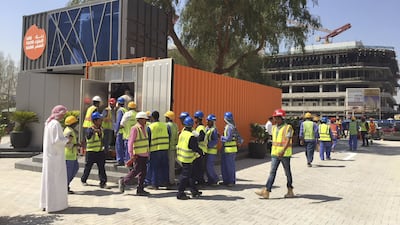Labourers queued up to collect food packages which were being distributed at the launch of the second food bank site in Dubai on Monday, which is also World Food Day.
More than 1,000 construction workers, cleaning and maintenance staff stood in lines for hot meals, tubs of yoghurt, bottles of juice and bread at the opening of the site in Al Bada - near Jumeirah - by Dubai Municipality. This was followed by food distribution in Al Quoz to more than 7,000 workers.
“This is very helpful for people like me because there are no restaurants here and we would need to go for lunch far away or carry food that may get spoilt in the heat,” said Mohammed, a driver who works for a furniture company.
“This will be good for all the workers in this area,” he said.
_______________
Read more:
UAE Food Bank receives between 30kg and 10,250kgs of food daily
Dubai campaign calls for 'zero tolerance' towards food waste
UAE’s first food bank launches in Dubai in bid to help needy and reduce waste
_______________
The UAE Food Bank was launched by Sheikh Mohammed bin Rashid, Vice President and Ruler of Dubai in April to allow hotels, supermarkets, catering companies, farms and food factories to donate surplus fresh and canned food to low income workers through the municipality.
Since the food bank began operating at the first site in Al Quoz this year more than 136 tonnes of food has been distributed with the maximum amount of food received from donors daily peaking at 10,245 kg.
“This promotes people to volunteer because it encourages companies and people to come together and collect good quality food that would otherwise have been wasted and distribute this to the needy,” said Hussain Lootah, director general of the municipality.
“This is a co-operation between charity organisations and food suppliers. We have plans for other locations in Dubai and also to expand outside the UAE.”
On Monday, workers lined up outside orange containers converted into storage depots as word spread that food was being distributed.
“I heard from others that the government is giving food free. If this is done every day, it will be good because we will not need to spend on one meal. We can save that money every day,” said Rahim Ali, a welder.
Restaurants, charitable trusts, supermarket chains have signed agreements with the municipality to maintain supplies.
“It’s a great initiative to feed the poor,” said Dhanika Dudeja, a marketing executive with Unikai, a food company that will supply the Food Bank with milk, juice and ice cream.
Fresh food is also available with suppliers sometimes donating poultry that is cooked by charities before being distributed.
“We get big quantities from companies, specially of dry food like rice. This is all good quality and can still be used instead of throwing it away. Our inspectors first check that it is as per our standard, then charities registered with us collect the food for distribution. Every day it goes to people,” said Khalid Al Awadhi, the municipality’s assistant director-general for environment, health and safety.
Logistics determine the location of the food banks which so far include high density workers’ areas such as Al Quoz, and Al Badaa where several food companies are located.
“We try to choose the most congested area so it’s easy to get food daily,” he said.
More than 100 refrigerators have also been installed by the municipality near mosques and residential areas to be stocked by residents for workers in the neighbourhood.
“The bank is a real opportunity to contribute to the institutionalisation of charity work by employing all effort and energy to establish the concept of participation and generosity,” said Sheikha Hind bint Maktoum, wife of Sheikh Mohammed and chairperson of the UAE Food Bank board of trustees.
There are plans to use the sites to train volunteers to collect, sort and re-package food in a bid to build a culture of compassion for the less fortunate.


